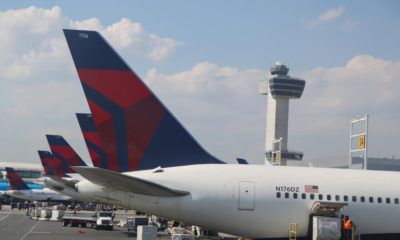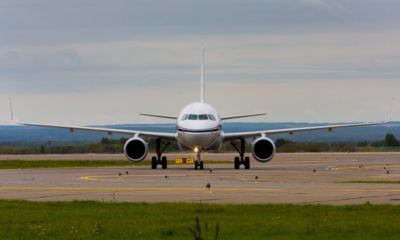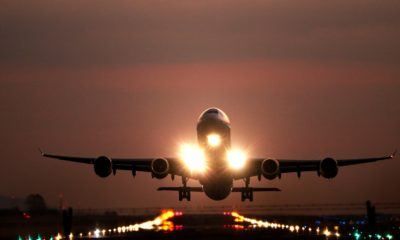Business
In-flight Entertainment Will Grow Post-Pandemic. Who Could Reap the Benefits, and When?
The airline industry took a huge hit during the coronavirus pandemic, and most stocks are still under pressure due to continuing travel restrictions. Some carriers, however, are better poised for recovery than others. Value-added services could help airlines eventually compensate for COVID-19 losses. The growing in-flight entertainment market presents new opportunities for long-term investors.

After a difficult year, most airlines saw a successful start to the summer travel season, with airports bustling and busier than they’ve been in months. But the travel industry is far from fully recovered.
Pandemic restrictions, intended to slow the spread of the now-dominant Delta variant, are putting a damper on airlines’ fiscal growth. Airline stocks globally, including American Airlines Group (NASDAQ:AAL), United Airlines Holdings (NASDAQ:UAL), Southwest Airlines (NYSE:LUV), and many others, are feeling the strain. Boeing (BA:NYSE) shares were 7% lower for July, on the bottom line of the Dow Jones Industrial Average.
Expect a long recovery period
Some carriers have been showing signs of improvement, although airline stocks remain on the low end, and recovery is still a long way off. Both American Airlines and Delta Air Lines (DAL) had better second-quarter results than expected. Potentially, some airline stocks could present opportunities for long-term investors.
Like many other traditionally conservative markets, the air travel industry used COVID-19 as a change to innovate and improve their practices. Touchless travel, pre-booked security slots, Big Data, AI, and more efficient route mapping are just a few examples of how airlines have adapted to the “new normal.” I believe value-added services, such as digital entertainment, could be a great way for airlines to generate additional revenue.
New niches to explore and make money
According to Mordor Intelligence, the in-flight entertainment and connectivity market was valued at $2.25 billion in 2020, and is expected to reach $3.6 billion by 2026. In an information-flooded world, the attention economy is more important than ever. The carrier, capturing passengers’ interest with its programming, would eventually dominate the air.
Most market players are considering more additional services:
- United Airlines announced recently that it will be focusing on in-flight entertainment as part of a major post-pandemic plan. The carrier is buying nearly 300 new planes with seatback screens, scheduled to arrive in the next five years. United Airlines is also adding screens to existing narrow-body planes, except for regional aircraft.
- American Airlines and Southwest Airlines, the U.S.’s largest domestic carrier, offer in-flight movies, shows, and live TV for passengers to stream on their own devices. Value-added services are especially important for low-cost airlines, which charge additional fees for any extra services.
- Boeing and Airbus are considering integrating digital entertainment systems. Toward the end of 2020, Boeing launched a new digital services platform called Digital Direct in collaboration with the wireless firm Immfly. The platform allows passengers to stream content wirelessly on their mobile devices through a web-based portal, without forcing users to download a separate app.
Which companies could benefit?
Aside from the air travel industry, some travel services and tech startups could also benefit from the growing in-flight entertainment market. Despite the risks, long-term VCs and angel investors should consider this new opportunity while it’s still a novelty.
For example, I invested in a new app providing passengers with real-time explanations of what to expect during flights. Initially, the startup focused on anxious travelers, helping them cope with fear of flying, but the concept has evolved over the course of the pandemic to include educational and entertaining content.
Cost-cutting measures are a monumental undertaking for many carriers post-pandemic. Content services available to passengers through their own devices allow airlines to remove seatback screens, making planes lighter, cheaper to operate, and, at the same time, provide passengers with much-needed entertainment on long flights.
Airlines changing their traditional practices made some improvements possible for travel services. For example, real-time flight trackers can now predict arrival time more accurately. In the past, security concerns prevented carriers from sharing flight information with tech companies, but now most airlines use two different servers. Thanks to these upgrades, travel apps can access the in-flight multimedia system, while the flight control system remains out of their reach.
As soon as global markets get back on their feet post-pandemic, air travel stocks will likely skyrocket, driving growth of value-added tech services. If you are a long-term investor, this is your opportunity to tap into a new market, although the recovery will still be slow. According to the forecasts, air travel could take until 2024 to return to 2019 levels.
—
(Featured image by JESHOOTS-com via Pixabay)
DISCLAIMER: This article was written by a third party contributor and does not reflect the opinion of Born2Invest, its management, staff or its associates. Please review our disclaimer for more information.
This article may include forward-looking statements. These forward-looking statements generally are identified by the words “believe,” “project,” “estimate,” “become,” “plan,” “will,” and similar expressions. These forward-looking statements involve known and unknown risks as well as uncertainties, including those discussed in the following cautionary statements and elsewhere in this article and on this site. Although the Company may believe that its expectations are based on reasonable assumptions, the actual results that the Company may achieve may differ materially from any forward-looking statements, which reflect the opinions of the management of the Company only as of the date hereof. Additionally, please make sure to read these important disclosures.

-

 Crowdfunding2 weeks ago
Crowdfunding2 weeks agoEvenFi Launches Run-Off Service to Protect Investors as Crowdfunding Platforms Exit
-

 Africa5 days ago
Africa5 days agoTunisia Holds Interest Rate as Inflation Eases, Debate Grows
-

 Crypto2 weeks ago
Crypto2 weeks agoEthereum’s Growing Capacity Puts Pressure on Layer 2 Platforms
-

 Cannabis7 days ago
Cannabis7 days agoCannabis and the Aging Brain: New Research Challenges Old Assumptions

























